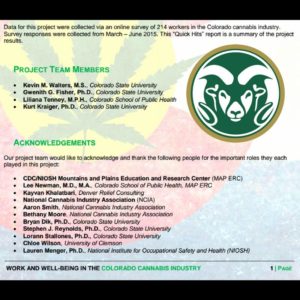By Kevin M. Walters, MS and Gwenith G. Fisher, PhD, Colorado State University
Who works in the Colorado cannabis industry? What are health and safety issues that these workers face? How can we optimize well-being among cannabis workers in Colorado? These are some of the questions that our research team had as we conducted our project, which we call “Work and Well-Being in the Colorado Cannabis Industry.” We first wrote about our project back in this blog post, when we put out a call for participants in our study. (Some readers may have even taken our survey!) In that blog post, we also mentioned that we’d share a report with the industry once the project was completed – which we’re excited to do now in this post!
In a nutshell, the aim of our project was to get a pulse on health and safety in the Colorado cannabis industry on the ground floor, as it continues to grow in Colorado and in other states. During our early work in the Colorado industry in 2013, we saw a strongly supportive industry with happy workers, but also saw a need for clearer health and safety standards and practices. This led us to develop and conduct this project, in which we surveyed 214 direct-to-plant workers in the Colorado cannabis industry. Our project team is excited to share our “Quick Hits” report with the industry, which provides an overview of our project results and our recommendations to improve health and safety. Thanks to the Center for Health, Work, and Environment at the Colorado School of Public Health, the full report can be found at this link.
The “Quick Hits” report provides lots of detail on our project, statistics, and recommendations – far more than we could mention in one blog post. As such, we encourage you to download the report and share it with your friends, colleagues, and businesses. To provide a brief summary of what we found, here are some of our key findings and recommendations from the report.
 First, in the report we provide a demographic overview of the industry in Colorado, such as the workers in the industry, their access to health care, and the organizations they work for. In addition to that, we describe a number of our findings on health and safety in the industry. Generally speaking, workers in Colorado’s industry felt like the work environment was fairly safe, and that their businesses strongly valued safety. That said, we also found that the quality and quantity of health and safety training varies greatly from business to business.
First, in the report we provide a demographic overview of the industry in Colorado, such as the workers in the industry, their access to health care, and the organizations they work for. In addition to that, we describe a number of our findings on health and safety in the industry. Generally speaking, workers in Colorado’s industry felt like the work environment was fairly safe, and that their businesses strongly valued safety. That said, we also found that the quality and quantity of health and safety training varies greatly from business to business.
For example, just under half of our participants (46%) received no health and safety training or received sparse training when they were hired (like a brief discussion, or a piece of paper). Therefore, when workers don’t view cannabis industry work as hazardous, it might be due to inconsistent health and safety training. To speak more on that, we did identify some hazards associated with cannabis work, such as ergonomic issues when trimming plants throughout the day or working in tight grow spaces. Another hazard we identified was pesticide use, as some workers reported symptoms such as skin and eye irritation, headaches, and dizziness after handling pesticides (among some other symptoms as well). In the report, we provide more detailed discussion on these issues, as well as some data on worker injuries.
On the plus side, the Colorado cannabis industry is tightly knit – workers felt lots of social support from one another and from their businesses. Based on our experiences in the industry, this came as no surprise! Industry workers were also very satisfied with their jobs and their lives, and felt like their jobs were meaningful. This may relate to the fact that most workers in the industry have a strong connection to cannabis – nearly two-thirds were medical card holders, and nearly all workers we surveyed used cannabis in some capacity.
A key strength of our report is the recommendations we provide that address both the physical and psychological aspects of cannabis industry work. Given the various types of health and safety training that workers received, we provide a list of recommended training topics for businesses. In addition, we provide research-based tips on what to do before, during, and after training programs to make sure that what workers learn in training is properly transferred to the job. After all, what good is training if it doesn’t stick?!
In addition to training recommendations, we also provide info on other resources (like this CDPHE Guide to Worker Health and Safety in the Marijuana Industry) and other general recommendations. For example, we encourage businesses to implement health promotion programs at work, offer various supports to employees, and strive for diversity and sustainability in the industry.
These are only some of the key topics in our report – we hope you download the report, share it with others, and enjoy the content! We would like to thank our project team, NCIA, Kayvan Khalatbari, and our other industry partners and research colleagues for all your help throughout the project.
___________________________________________________________________________________
 Kevin M. Walters, MS, is a doctoral student at Colorado State University in Industrial-Organizational Psychology (the scientific study of the workplace) and a trainee in Occupational Health Psychology (applying psychology to improve the quality of work life, and to protecting and promoting the safety, health and well-being of workers) through the Mountains and Plains Education and Research Center (MAP ERC). His research focuses on worker well-being and positive aspects of work, such as job satisfaction and meaning of work, with a special focus on workers in the cannabis industry. You can contact with any questions or comments at kevin.m.walters@colostate.edu.
Kevin M. Walters, MS, is a doctoral student at Colorado State University in Industrial-Organizational Psychology (the scientific study of the workplace) and a trainee in Occupational Health Psychology (applying psychology to improve the quality of work life, and to protecting and promoting the safety, health and well-being of workers) through the Mountains and Plains Education and Research Center (MAP ERC). His research focuses on worker well-being and positive aspects of work, such as job satisfaction and meaning of work, with a special focus on workers in the cannabis industry. You can contact with any questions or comments at kevin.m.walters@colostate.edu.

Gwenith G. Fisher, PhD, is an Assistant Professor and Program Coordinator of Industrial-Organizational Psychology at Colorado State University. She is also the Director of the MAP ERC Occupational Health Psychology Training Program. Her research focuses on work-life balance, as well as health and well-being of workers, with a special focus on older populations and those nearing retirement.

Follow NCIA
Newsletter
Facebook
Twitter
LinkedIn
Instagram
–